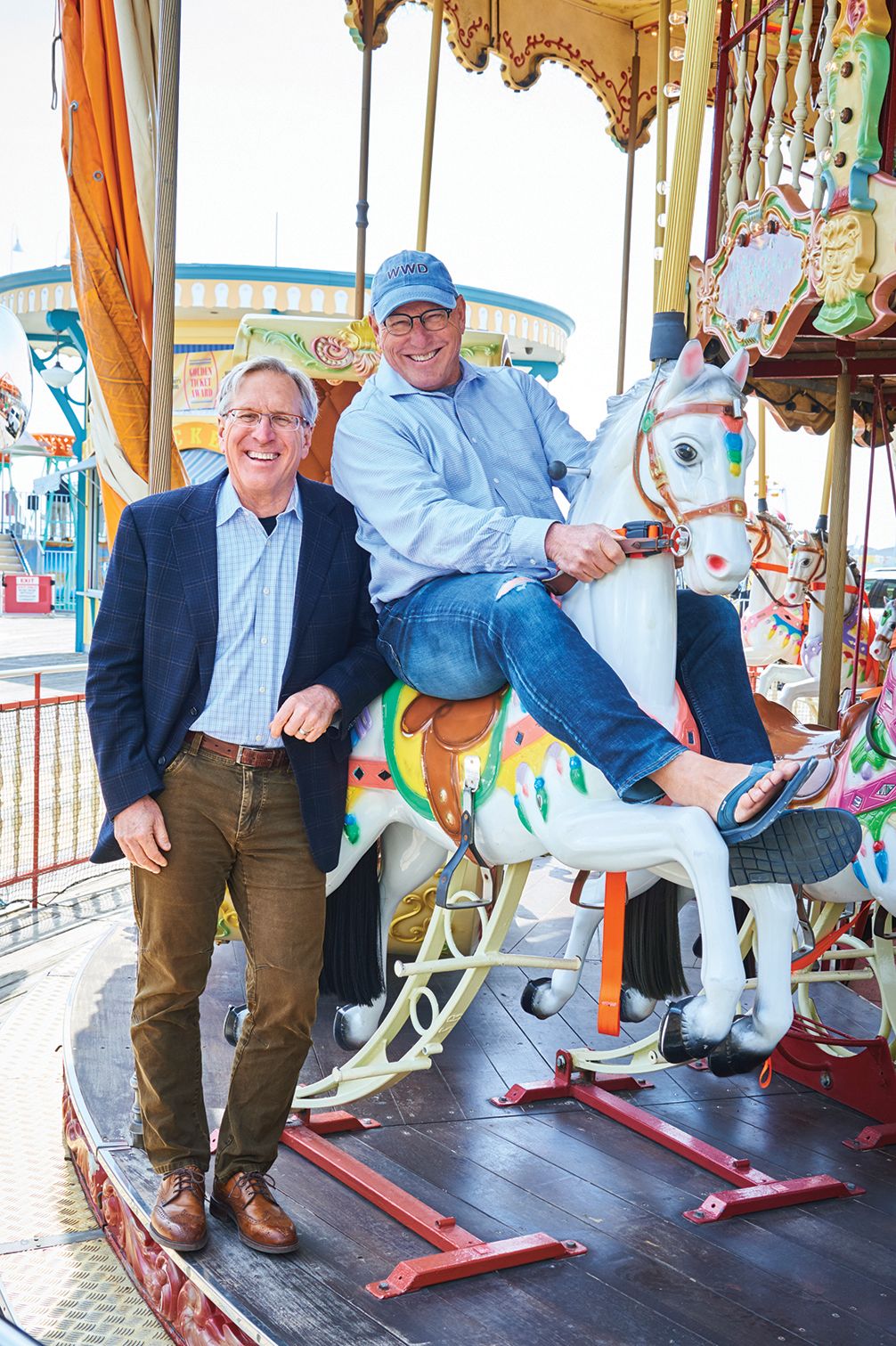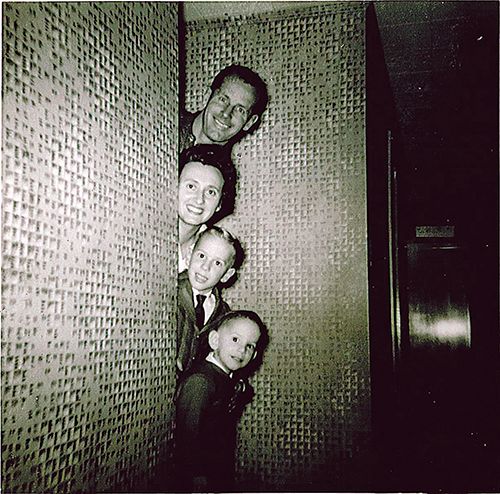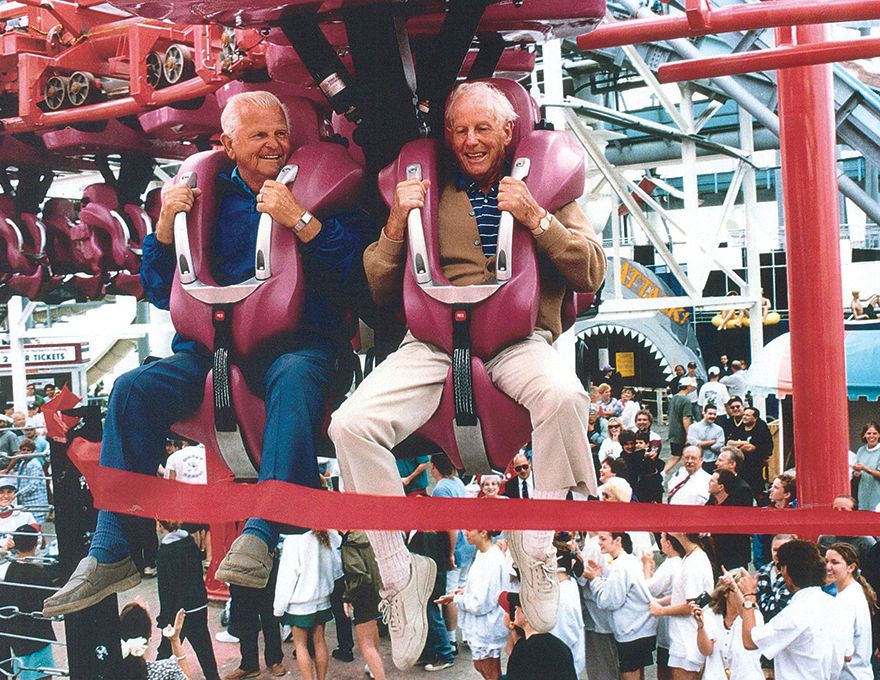It's two days before the season opening of Morey's Piers, three boardwalk amusement parks in The Wildwoods, a New Jersey seaside resort about 90 miles outside Philadelphia. On this April afternoon, stands are being stocked with candy and stuffed animals at Morey's Surfside Pier, and the famous Curley's Fries have drawn the attention of the bird population. A sweet scent on the breeze suggests that the funnel cake fryer is also getting a test run.
 At one of the games, seasonal employees are learning what to say and how to respond to customers, whether they win or not. An enthusiastic trainer gives them tips on how to get visitors' attention despite the myriad distractions on the pier.
At one of the games, seasonal employees are learning what to say and how to respond to customers, whether they win or not. An enthusiastic trainer gives them tips on how to get visitors' attention despite the myriad distractions on the pier.
The company has distributed play money to the employees working that day and shifts are set up to get first tastes of a seaside lunch at Jumbo's Grub and Pub, whose menu includes crab cakes, salads and chicken fingers. This is an opportunity for the kitchen and wait staff to practice service and test a new point-of-sale system.
There are lots of pats on the back, hugs and laughs when all eight members of the Morey family are together on one of the piers. The second generation, Jack and Will Morey, leads the business. The third generation — Will's two sons and Jack's two sons — is coming up through the ranks, moving through various roles in the entertainment empire.
Over the next few months, Morey's Piers will employ 1,500 people and host 3.5 million guests. The Moreys will open a new rollercoaster to commemorate the 50th anniversary of the business. The coaster will be modeled after the Sightseer, the Wildwoods tram car that rides up and down the five-mile boardwalk and warns pedestrians, “Watch the tram car, please!” hundreds of times a day. It's a fixture of summertime at “the shore.”
Will Morey, 61, says incorporating the culture of the boardwalk is vital to sustaining the success of the enterprise.
“I think today we're really focused on creating an outstanding family social environment beyond just the rides,” he says. “The real draw here is the seashore. We know that.”
Sliding into the amusement park business
The Moreys' business history stretches beyond boardwalk amusements.
Wilbert C. Morey, known as Will, started developing Wildwood tourist accommodations in 1957 via a loan from a car dealer. He built Fantasy Motel on West Rio Grande Avenue, which, like other motels in the Wildwoods in the 1950s, featured an architectural style known as Doo Wop. Will started a pattern of beach development leapfrog. He would build a motel and put his wife, Jacqueline (Jackye), in charge of operating it. Then he'd buy property closer to the beach and build again. When the second motel was done, he sold the first, Jackye moved on to run the second and Will built a third motel. It took a while for the Moreys to become solvent.
“Mom was throwing up — literally — when she had to pay the bills,” says Jack, 58.
The biggest gamble was the building of the oceanfront Pan American Hotel. Will bought an entire block of waterfront property and created a design based on the Americana Hotel in Miami Beach, Fla., where Will and Jackye stayed on their honeymoon. The new building would be very different from typical Wildwoods lodging. There would be corridors inside — a hotel instead of a motel.
“In his prime, Wilbert would be infamous for saying he would see great things around the world and then ‘Wildwoodize' them, which meant build it on a Wildwood seasonal budget,” Jack says.
 “Mom said there were two kinds of people”: those who “just didn't think he would get it done” and those who “knew he wouldn't get it done.”
“Mom said there were two kinds of people”: those who “just didn't think he would get it done” and those who “knew he wouldn't get it done.”
Will did get it done. Once the Pan American opened, the Morey family had financial security for the first time since they started as developers.
Since they had some breathing room, the family moved to Florida in the off-season. Jack went to school in Florida, including college. Jack's brother, Will, also went to college in the south.
In the winter months, their father would travel to New Jersey regularly to check on the hotel. In the summer, the family would come north. Will built a penthouse at the top of the Pan American, and that's where they lived.
In the fall of 1968, Will's brother William (Bill), who was selling concessions on the boardwalk, asked Will to go with him to a parking lot in Fort Lauderdale, Fla., to see something Bill thought was extraordinary: a huge fiberglass slide. Bill wanted to build one in the Wildwoods with his brother.
They ordered the slide, put it together and introduced the North Wildwood boardwalk attraction as “Wipe Out” in the summer of 1969.
Monsters, invasions and wars
The giant slide “launched a different kind of animal,” Jack says. With their entry into the amusement business, the Moreys drew on their passion for innovation. “Every year for decades we said, ‘What do we add next year?' ”
Over the history of Morey's Piers, there were very few years when nothing of note happened. Rides were constantly being added or reimagined, new hotels were built and restaurants were opened. Even the names of the piers have changed over the decades.
Jack says the family invested in the piers “semi-responsibly, semi-irresponsibly.”
The first round, in the 1970s, centered on monsters and hit movies of the day: King Kong, The Poseidon Adventure, Star Wars. In 2015, “Kong” was reintroduced in an homage to the classic ride: Thrill seekers fly 60 feet above ground in airplane-shaped cars, circling a gorilla perched on a lighthouse, manhandling a tram car.
Ideas for what to add came from the family's travels, initially in Europe. That's why the company refers to the 1980s as “The European Invasion.” The invasion was inspired by Oktoberfest, but not because of the beer. (Morey's Piers didn't serve alcohol until 2011.) Jack says the rides at the famous German festival were like nothing he had seen before.
“The carnival scene in Western Europe is still fairly vibrant. There are no theme parks, just giant carnivals.” He says German rides are marked by the highest quality of engineering.
During this time, the Moreys began importing rides to New Jersey from Europe. “It was absolutely revolutionary at the time,” Jack says.
In the 1990s, the family became embroiled in what they refer to as “The Coaster Wars” — making big investments to compete with other amusement parks' thrill rides.
“That's where we got into trouble,” Jack says. The rides “were fun not just to ride on, but to build. And they aren't cheap.”
He says there were two fronts to that war — internal and external.
The business was “flirting with excessive reinvestment,” in an effort to lure visitors away from regional theme parks like Great Adventure in Jackson Township, N.J., or even a Disney park. When expenses threatened to outpace income, the family considered adding a front gate and charging admission to enter the parks.
“In our chase to be more like a traditional theme park … we found ourselves definitely trying to be something we shouldn't have tried to be,” Jack says.
 The family ultimately decided not to add a gate (see related article: Open Space). They concluded a barrier to entry would stray too far from their commitment to be a seamless part of the community. Visitors can stroll through the Moreys' amusement piers without purchasing anything.
The family ultimately decided not to add a gate (see related article: Open Space). They concluded a barrier to entry would stray too far from their commitment to be a seamless part of the community. Visitors can stroll through the Moreys' amusement piers without purchasing anything.
A reorganization and a split
In 1995, after the business bounced back from the coaster wars, Wilbert Morey retired and his son Will took over as CEO. That year the piers, hotels and restaurants were consolidated under a holding company, The Morey Organization. The parks still operate as Morey's Piers.
With the change in leadership, the consolidation of operations and the decision against an admission charge, fissures formed between Will's and Bill's families.
“In some respects, it came out of nowhere, but when you really look back, maybe there were some telltale signs,” says Will. “At the end of the day, the big dog in the room was that we just weren't sophisticated as an organization. We didn't have a communications structure that got us talking about the right things on a regular basis.”
There was a settlement in 2005. The details are confidential, but Bill's family exchanged their stake in the holding company for property not connected to the initial business.
Will thinks an essential piece was missing: He and Jack didn't have strong relationships with their cousins.
“We didn't know each other as family members,” Will says. “There really wasn't any family glue. We only had the business stuff.”
Now the relationship is better between the branches; Will says he's talked about the break over lunch with one of his cousins in the years since the settlement.
“He was thoughtful and willing to say, ‘Hey, we made some mistakes here.' But there were enough mistakes to go around,” Will says.
Will and Jack's children remember little if anything about the conflict, and it hasn't deterred them from joining the family business.
 “I don't think it gave me pause,” says Will Barrett Morey, Will's eldest son, 33, who is director of the water parks. “If anything, it made me aware that it could happen. I think about that going forward a lot.
“I don't think it gave me pause,” says Will Barrett Morey, Will's eldest son, 33, who is director of the water parks. “If anything, it made me aware that it could happen. I think about that going forward a lot.
“There's no road map for how you're going to work through things when they come up. That's why it's important to work through small disagreements.”
Zack Morey, Jack's eldest, thinks that if there had been more formal policies and communication channels, the split may have been avoidable. Zack, 29, who manages the company's hotels, notes that the company now has in-house counsel.
Course correction
Another adjustment the company made in the '90s was to stop measuring Morey's Piers against other parks. Morey's didn't have to be Great Adventure. And it definitely didn't need to be Disney.
In 1997, Jack met Steve Izenor, a partner at the architectural firm Venturi Scott Brown in Philadelphia and co-author of Learning from Las Vegas. Izenor's book examined the impact of factors such as design, signage and commercial vernacular on culture and progress. Izenor was interested in the Wildwood story and the shift of the boardwalk from Doo Wop to a more modern, subdued aesthetic. Izenor's team eschewed the new style.
The results were sent by fax to the Moreys' office with a clear prescription, Jack says. “ ‘Take tacky to new heights.‘ But [Izenor] said it in a poetic manner.”
Jack also notes architect's Robert Venturi well-known statement that more is more, but “less is a bore.”
The concept, Jack explains, is that urban planning should establish signage size minimums, not maximums, and pop culture, even when driven by commercialism (he cites the McDonald's arches as an example) should be treated as “the crown jewel of commercial archeology.” Jack embraces what he considers his primary job in the company: to “slightly organize the chaos that can be embraced by all classes and affluences.”
Will, a Cape May County freeholder (a member of the county governing board), refers to the vibe at the piers as “zaniness” rather than his brother's “tacky” label.
However, the entire Morey family wants the piers to sustain their own niche. For example, instead of national brands, Morey's offers its own food and souvenirs to make the experience unique and authentic. The piers have been revamped to ensure they're fun for the entire family, not just the kids. “Elevated” restaurants have been adde and the water parks now offer cabanas. There is even a bar, PigDog Beach Bar, at the end of Mariner's Pier.
When the company moved to serve alcohol in 2011, there was resistance. Residents feared the change would create more of a nightclub atmosphere than a family fun space.
 “In some respects, kids tugged at their parents' coattails and said, ‘I want to go to the boardwalk' and parents took them and counted the minutes until they could leave,” Will says. “We wanted to make an environment that adults want to go to as well. Now we find parents are coming with their kids and staying longer.”
“In some respects, kids tugged at their parents' coattails and said, ‘I want to go to the boardwalk' and parents took them and counted the minutes until they could leave,” Will says. “We wanted to make an environment that adults want to go to as well. Now we find parents are coming with their kids and staying longer.”
Lessons learned
The family took a few steps to ward off potential issues as the company once again moves toward cousin control (far in the future, say Jack and Will). Will says it wasn't about making the organization “stiff.” Rather, “We struggled once, let's not struggle again.”
For one, there is a board of directors that meets three times a year. The board is made up of the brothers, their wives and Jackye's brother, Barry Gehring, who managed one of the piers for several years and has a 10% stake in the business. He now runs the arcade at Morey's on a long-term lease.
“We need to take a look at a couple of independent directors, if in an advisory capacity, to have as a tool,” Will says. “We have in the past, but we're probably at that point again. We need to look at what will our next move be.”
There is also an officers' group, which includes Will, Jack, COO Geoff Rogers, CFO Joe Cleary and general counsel Steve Fram. The G3 sons are invited and encouraged to attend all officers' meetings as their various operations schedules permit.
Will and Jack say they're waiting to see who steps up and wants to run the business. The family has talked about succession, but they haven't made any formal plans or written anything out.
Will's younger son, Kyle, who manages the waterparks' restaurants, wrote his MBA dissertation on the subject of succession. Another third-generation member, Will's son Jordan, is general manager of the piers' restaurants.
The Moreys may also look to employment policies in the future. Some third-generation members joined the family business right out of college, while others worked elsewhere.
Zack worked in Vail, Colo., at a hotel and says he learned a great deal from that experience. His cousin Will, on the other hand, went straight into the family business.
“I reserve the right to change my answers,” says third-generation Will. “I think I would like my kids to go somewhere else for a couple of years and then come back if they want.”
Regardless of when a family member starts at the company, the G2 brothers have worked to make sure no one feels entitled to a certain position or compensation. At the same time, no one will be penalized for trying something new. The four G3s are encouraged to move around the company to obtain a wide breadth of knowledge.
“They receive the same pay as they move to different parts of the business. You shouldn't go [to another department] as the new guy all over again and get a knock in pay,” says the elder Will.

The third generation is also being left to make some of their own decisions and work out their own disputes, he says. “Ultimately they're going to have to do that if they continue to work together.”
New horizons
As Morey's Piers moves into the next 50 years, the family would like to see expansion, but it may not be in the Wildwoods.
The family says the beach is their home, but they have built a lot there and it's time for new challenges.
“You don't have to be perfect to be outstanding, and in some ways we've achieved that or near that,” says second-generation Will. “And making sure we're at that 95 [percent]-plus level [here] is a priority.
“But my brother is a big believer that the favorite project is the next project.”
There is no solid plan, but the timeline is five to 10 years.
“It's not something we've really focused on,” Will says. “We want to look into tourist-related business in other communities.”
His son agrees.
“This place will never be done,” says Will Barrett Morey. “But from a business continuation high-level strategy, we should diversify from here.
“One thing I'm learning from my uncle is you're just never done. And if you just want to sustain, that's a recipe for decline.”
Copyright 2019 by Family Business Magazine. This article may not be posted online or reproduced in any form, including photocopy, without permission from the publisher. For reprint information, contact bwenger@familybusinessmagazine.com.

